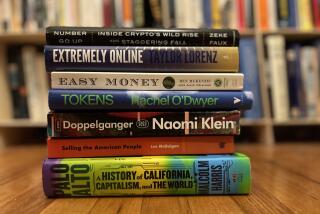Y2K Bug Eats Into Our Social Fabric
- Share via
Have you noticed how, the closer we get to the new millennium, the less often anyone refers to it as the new millennium? Instead, we hear everywhere of the great “Y2K,” that high-tech apocalypse that has replaced the more medieval apocalyptic connotations that the word “millennium” suggests. Which leads me to ask a question:
Why 2 K?
I think there’s an easy answer to that one. Y2K has a snazzy high-tech flair to it that is right in keeping with the times. After all, it is likely that we will remember the ‘90s as the decade in which the computer revolution was finally accomplished. With the Internet having emerged as the most culturally significant technological development since television, computers have entered our lives, and consciousness, in a way that they have never done before. Once despised as cold, establishment machines that ordered us not to fold, spindle or mutilate, computers now sport a hip new image, cutting edge and charged with attitude.
The dawning of the age of cyber-quarius has a lot going for it, of course. I think that it has had a lot to do with the reversal of America’s fortunes in the last 10 years, and certainly California’s. One only has to compare the dismal outlook of the early ‘90s to the current, more buoyant cultural attitude, both nationally and statewide, to see how far we have come, and the cyber revolution can take a good deal of the credit for that.
This change in attitude is especially apparent in America’s youth culture. The 1990s came in, for example, with a grunge aesthetic that was launched against a backdrop of economic stagnation and Gen-X angst. But with the electronic frontier beckoning to a new generation of post-Xers, the anxieties of the grunge scene have evaporated. Grunge is dead; long live techno pop.
With so many people feeling so much better about their lives, I will not play the Luddite and rail against the techno revolution. It’s here to stay anyway, no matter what we may think of the role it is playing in the increasing division between the rich nations and the poor internationally, and the rich and the poor in our own country. But I do want to point to something that it behooves even the most enthusiastic partisan of the techno age to consider.
As so often happens with me, my cue here comes from an advertisement. You may have seen it during the broadcast of the last game of the NBA Championship Finals. It was an ad for Polaroid cameras that was clearly attempting to capitalize on the Y2K hysteria. The scene was one of urban apocalypse: dark city streets with panicked crowds milling around. One plucky young man raced through the streets trying to beat the stroke of the millennial midnight, making it to an unused automated teller machine just in time to ring up his checking account balance ($342) on the screen and photograph it with his Polaroid. Then midnight strikes, the Y2K-glitched screen goes blank for a second, then a new figure comes up: $42 million this time. He photographs that, gleefully. End of ad.
*
Without their realizing it, the creators of this ad have created a parable for the cyber age. That parable tells us, first, that only the individual matters (we note how the young man is concerned solely with his own survival as the world around him descends into chaos), and second, that the way to get rich is through a lucky break, no matter how unethical it may be. And isn’t this exactly what is happening in the real techno world today as “anything.com” companies that haven’t yet made a profit make huge scores in the initial public offering sweepstakes, and a handful of lucky traders score by timing their speculations right?
Such a world in which the easy buck is so highly valued contradicts an American tradition that promoted hard work as the means to success. The Protestant work ethic seems to be vanishing in the wake of what I’ll call the Cyber Gold Rush, the stampede for the easy buck. So far that doesn’t seem to have hurt us much, but eventually, if the message we send to our children continues to be that the good life is to be had through luck rather than effort, we’ll have a society of nothing but gamblers. What will be lost if that happens will be the energy and initiative that put us at the forefront of the computer revolution in the first place. And that’s a Y2K scenario that I, personally, find rather frightening.
More to Read
The biggest entertainment stories
Get our big stories about Hollywood, film, television, music, arts, culture and more right in your inbox as soon as they publish.
You may occasionally receive promotional content from the Los Angeles Times.










